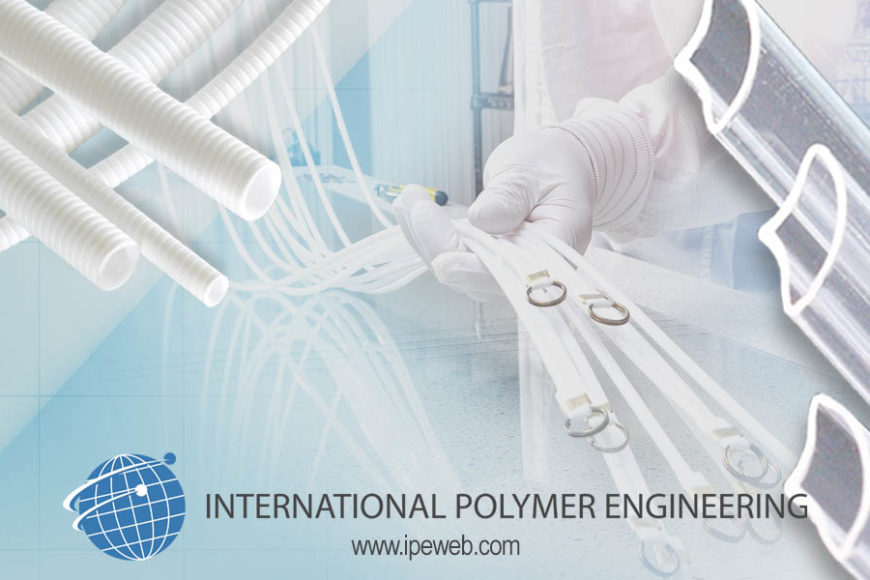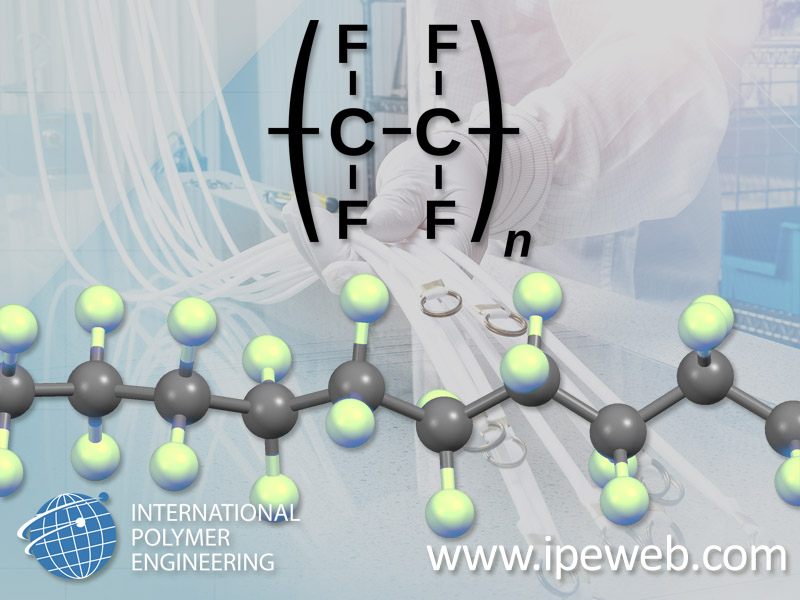
Polytetrafluoroethylene (or PTFE) is a particularly versatile ivory-white and opaque plastic fluoropolymer that is a rather difficult material to bond as it is non-stick by nature. It is created by the free-radical polymerisation of many tetrafluoroethene molecules, and is suitable for a wide range of applications in diverse industries such as medical, dental, aerospace, the food and drink industry, pharmaceuticals, telecommunications, and more. PTFE is so difficult to bond because the chemical bonds that form the fluoropolymers are so stable that it is difficult to join it to anything else, even for a short period of time.

Figure 1 : The molecular structure of PTFE. The bonds between the Carbon and Fluorine are very strong and the wrapping of the Fluorine atoms around the Carbon in the structure protects those bonds.
The physical and chemical properties of PTFE can be critical to a variety of medical and non-medical applications in the form of tubes, rods, sheets, and specialty profiles. Many of these applications require bonding the fluoropolymers either to themselves or to other materials. However, since fluoropolymers are designed not to stick to other surfaces they require either a special adhesive or surface preparation before bonding can be achieved.
There are two types of adhesives that can be used to bond fluoropolymers:
- Contact Adhesives
- Bonding Adhesives
Contact Adhesives
Contact Adhesives can be applied to the fluoropolymer surface without modification to the surface prior to bonding. These types of adhesives are either contact or pressure sensitive and are perfect for adhering large surface areas to one another. The adhesives can be either liquid or double-sided tape and can be directly applied once the surface of the fluoropolymer has been thoroughly cleaned of all surface contaminates. These types of adhesives tend to have a relatively weak bond strength in the range of 0.1-0.8 kg/cm.
Bonding Adhesives
Bonding Adhesives require surface modification or treatment in order to bond properly. Once the fluoropolymer surface has been etched it is ready to be adhered and the type of adhesive used depends on the chemical resistance, flexibility, and temperature resistance needs of the final product.
The most common types of modification treatments include:
- Alkali metal sodium etching : Though this form of chemical treatment is the most dangerous to perform it is also the most common. Chemical etching fluoropolymers with sodium results in a highly porous defluorinated layer and significantly increases its bond strength capabilities. However, exposure to UV light, abrasion, heat, and other oxidizing agents will degrade the sodium treated surface.
- Plasma treatment : Plasma treatment changes the surface morphology of the fluoropolymer – the results of which differ depending on which plasma gas is used. The surface is struck with energized atomic fragments which defluorinates the fluoropolymer preparing it for bonding.
Bonding utilizing adhesives is perfect for applications where the fluoropolymer isn’t required to hold or carry a heavy load.
A Bit More About Etching
Fluoropolymer etching, as briefly touched on above, releases Fluorine atoms and exposes Carbon atoms for chemical attachment. This process is dangerous and should only be done in the proper environment and with all recommended safety equipment. The layer of atoms that is removed is so thin that it is measured in angstroms (which is equal to one hundred-millionth of a centimeter). The etching process causes the PTFE surface to darken in color to a brown or tan hue, however the color is not an indicator of the effectiveness of the etch. Once the PTFE has been etched the surface can be glued, molded, or bonded to other materials. It also allows the PTFE tubing surface to be printed on or engraved. The properties of the PTFE are kept intact under the etched surface.
The next articles in this series will discuss the thermal fusion and reflow processing with ePTFE as well as thermal bonding of other polymers and bonding of ePTFE/PTFE or ePTFE/ePTFE. Keep an eye out for those in the coming months.
International Polymer Engineering is one of the only plastic extruders who specialize in manufacturing custom ePTFE FluoroFlex™ and thermoplastic products. On top of our state-of-the-art rod, tube, and sheet extrusions we also offer bending, flaring, precision milling, and bonding; as well as design & development, material testing & analysis, and clean room processing. We are also ISO 13485:2016 certified to ensure stringent quality standards. IPE is your total solution provider. Contact us to get started on your next project today!
